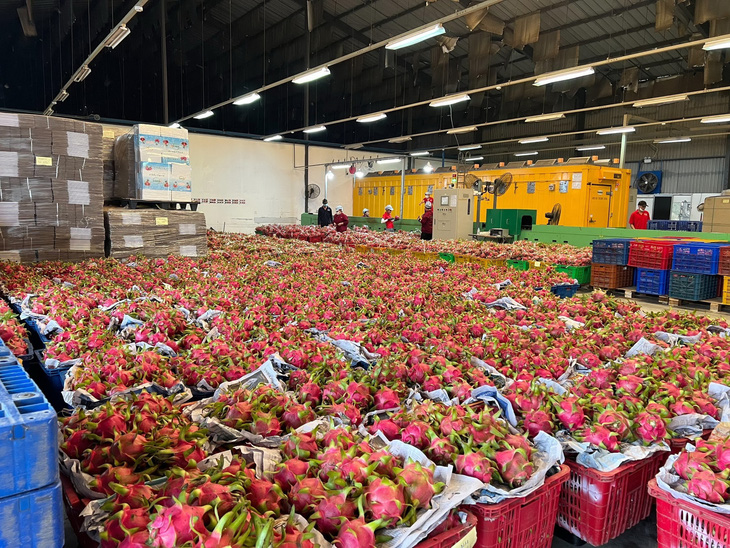Many Vietnamese farmers and enterprises exporting red-flesh dragon fruits to Japan are worried about a new regulation that requires dragon fruit exports to have planting area codes.
The difficulty lies in the fact that Japan allows only the LD1 dragon fruit variety, one that belongs to a private company in Long An Province, southern Vietnam.
As the regulation has just been issued, many local exporting enterprises will fail to meet it and have to sell their dragon fruit at wholesale markets, suffering huge losses.
In mid-January, five shipping containers of some 70 metric tons of red-fresh dragon fruits worth US$190,000 from Yasaka Fruit Processing Co. Ltd., which specializes in exporting fruits to Japan, failed to be shipped to Japan.
A phytosanitary center under Vietnam's Plant Protection Department announced that both white- and red-flesh dragon fruit exports to Japan must have planting area codes.
Nguyen Trong Trung Dung, deputy director of Yasaka Fruit Processing Co. Ltd., said the requirement came out of nowhere since Japan has officially allowed the importation of white-flesh dragon fruits since 2009 and red-flesh dragon fruits since 2017, and these products have been exported to the East Asian country without planting area codes.
“In mid-January, we received a notice about the requirement via email. As it was unforeseen, exporting enterprises, cooperatives, and farmers were in a deadlock and had to suspend the export of red-flesh dragon fruits to the Japanese market,” Dung said.
A representative of Green Bud Import-Export Co. Ltd. based in District 10, Ho Chi Minh City said dragon fruits cannot be exported to Japan due to these obstacles although it is now the peak export time.
Dung from Yasaka Fruit Processing Co. Ltd. reported that to have a planting area code, local enterprises must prove that their dragon fruit variety is LD1.
Meanwhile, the Southern Horticultural Research Institute transferred the protective certificate for LD1 red-flesh dragon fruits to Hoang Phat Fruit Co. Ltd. in May 2017 with a protection term of up to 20 years.
However, seven to eight years before the event, the Southern Horticultural Research Institute had sold the LD1 red-flesh dragon fruit variety to farmers in many southern provinces.
Therefore, farmers find it hard to apply for planting area codes.
According to Dinh Thi Phuong Khanh, deputy director of the Department of Agriculture and Rural Development of Long An Province, 193 dragon fruit farms with a total area of over 9,900 hectares in the province have been issued planting area codes.
“Earlier, farms had to meet the requirements on area, plant protection, drug management and use, information storage, and farming conditions to be granted the planting area codes," Khanh added.
“However, Japan and South Korea have required imports to have protective certificates, but most dragon fruit farms getting codes fail to meet the requirement."
In Long An, no enterprises have complained about difficulties in exporting dragon fruits to Japan and South Korea as most dragon fruit batches have been exported to the two countries through Hoang Phat Fruit.
“However, the department has asked the company to support in certifying the variety for export to Japan and South Korea in case local farmers face difficulties,” Khanh noted.
Nguyen Khac Huy, director of Hoang Phat Fruit Co. Ltd., told Tuoi Tre (Youth) newspaper that after the Southern Horticultural Research Institute successfully created the LD1 red-flesh dragon fruit variety in 2015, he acquired the variety at VND5 billion ($211,876).
To compete with foreign rivals, Vietnam needs high-quality varieties.
“The compliance with regulations on intellectual property and copyright is in line with international standards and helps reduce the unhealthy competition among exporting companies, thus helping Vietnamese enterprises to compete with other agricultural countries,” Huy said.
At present, Hoang Phat Fruit is underwriting some 100 hectares of red-flesh dragon fruits to ensure supply to importing markets.
“I buy the LD1 dragon fruit from farmers at a high price for export,” Huy added.
A representative of the Plant Protection Department under the Ministry of Agriculture and Rural Development stressed that the requirement of dragon fruit and mango planting area codes was set out by Japan.
“There are many red-flesh dragon fruit varieties but Japan allows the LD1 variety only. Therefore, enterprises must prove that their products are the LD1 variety to be granted planting area codes,” the representative said.
According to Nguyen Nhu Cuong, head of the Department of Crop Production, some farm produce importing markets have required the variety origin certificate.
“Hoang Phat Fruit has secured the protective certificate for the LD1 red-flesh dragon fruit variety from the Southern Horticultural Research Institute. Therefore, enterprises must work with Hoang Phat Fruit to be issued planting area codes in order not to violate the Intellectual Property Law while meeting the requirement of importing countries,” Cuong said.
The protection of Vietnam’s plant varieties is essential to stabilize markets and improve the quality of farm produce.
Like us on Facebook or follow us on Twitter to get the latest news about Vietnam!



















































